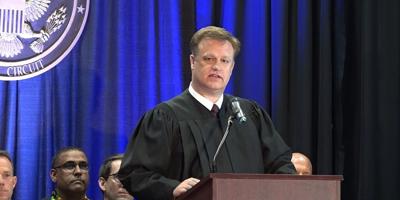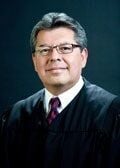
U.S. Ninth Circuit Judge Ryan D. Nelson
SAN FRANCISCO - A court fight over states' power to combat voter fraud could be headed to the U.S. Supreme Court, after the full U.S. Ninth Circuit Court of Appeals refused to review an earlier decision blocking Arizona from using state law to force voters to prove they are citizens and then regularly audit the state's voter rolls to remove ineligible voters.
The denial of rehearing, delivered Sept. 22, drew dissents from 11 of the Ninth Circuit's 29 active judges, including a blistering dissent authored by Ninth Circuit Judge Ryan D. Nelson, and joined by many of his dissenting colleagues.
In the dissent, Nelson blasted the court's majority for violating not only U.S. Supreme Court precedent, and prior Ninth Circuit rulings on the key legal questions involved in the case, but also accused them of twisting federal law to find that states cannot demand voters prove they are citizens when registering to vote and all but protecting the right of non-citizens to remain registered to vote.
The ruling, Nelson warned, only continues to undermine the legitimacy of the Ninth Circuit court, the rule of constitutional law, overall, in the U.S., and the legitimacy of the outcomes of elections.
"Republican government serves as the keystone of the Constitution," Nelson wrote. "In such a government, a majority of citizens who lawfully vote determines who represents us in the White House, Congress, and state legislatures.
"Courts must therefore defend the franchise - both by protecting the right of all citizens to vote, and by ensuring non-citizens do not vote...
"Sadly, the panel majority opinion undermines republican government, shreds federalism and the separation of powers, and imperils free and fair elections."
The case landed in federal court in 2022, as the Democratic Party and a coalition of left wing political groups, particularly those who advocate for immigrant rights and expanded voting rights, filed suit to challenge Arizona state laws enacted by the state's Republican legislative majority and signed into law by Republican former Gov. Doug Ducey to set new requirements designed to reduce the chances for non-citizen vote fraud.
The lawsuit was also joined, at the time, by the federal Justice Department under Democratic former President Joe Biden.
Among other obligations, the laws required all voters to supply documented proof of citizenship when casting a ballot by mail. It also set in place a system of regular audits of the state's voter rolls, with the goal of swiftly and regularly removing non-citizens and other ineligible voters from Arizona's roster of registered voters.
In the legal challenge, the activist groups and Biden administration claimed the law violated federal civil rights laws and the federal National Voting Rights Act.
A federal judge agreed and blocked the measure with an injunction.
Arizona appealed, but also lost at the Ninth Circuit.
In that 2-1 ruling, the appellate majority, which included two appointees of Democratic former President Bill Clinton, said the law was enacted with discriminatory intent against immigrants and Hispanic voters, and amounted to "voter suppression."
The majority reasoned that the National Voting Rights Act forbids states from requiring voters to present documents proving they are citizens, beyond their mere attestations that they are citizens and eligible to vote.
They also ruled the NVRA forbids states from conducting "systematic" purges of those ineligible to vote.
Ninth Circuit Judge Patrick Bumatay dissented, saying that, while some provisions in Arizona's laws may be unconstitutional or conflict with federal law, the bulk of those laws - and particularly those requiring voters to prove their citizenship to vote for president and to vote by mail - should not be blocked.
Supporters of the laws have indicated the decision will be appealed to the U.S. Supreme Court, particularly since the U.S. Sixth Circuit Court of Appeals reached opposite conclusions on similar legal questions concerning the ability of state to require voters to prove their citizenship and thus, their right to vote.
Such a scenario is known as a "circuit split," in which different federal appeals panels reach opposing decisions on the same legal questions, effectively setting up different laws and rules for different parts of the U.S.
In this case, the Ninth Circuit ruling sets up a legal regime under which state governments cannot require proof of citizenship from would-be voters in the states of California, Arizona, Nevada, Washington, Oregon, Montana, Idaho, Alaska and Hawaii, while the Sixth Circuit allows such requirements in the states of Kentucky, Michigan, Ohio and Tennessee.
Such circuit splits on key constitutional questions often leads the U.S. Supreme Court to step in to resolve the questions for the entire country.
However, before petitioning the Supreme Court, Arizona asked the Ninth Circuit to review the three-judge panel's decision en banc - meaning before a full complement of 11 Ninth Circuit judges.
The Ninth Circuit rejected that petition, saying a majority of the court's 29 judges did not agree to the en banc rehearing, effectively allowing the three-judge panel's ruling to stand and the injunction against Arizona's law to remain in place.
That decision denying the rehearing drew sharp dissents from 11 judges.
In his dissent, Nelson said the Ninth Circuit's rulings on the question are legally and constitutionally indefensible.
Nelson said the Ninth Circuit's refusal to take up the case again amounts to defiance of the U.S. Supreme Court. In his dissenting opinion, Nelson noted the Supreme Court has already indicated "that Arizona's requirement was lawful in this very case," and had further "cited Arizona's prior citizenship documentation requirement ... as the example of a permissible state form requirement" in a separate matter.
While the Supreme Court did not explicitly state those findings should decide the matter, nor order the Ninth Circuit to comply with any order, Nelson said the Ninth Circuit all but ignored the high court's strong hints in the matter and pressed ahead with its own holdings.
"These are bold judicial moves by the majority and warrant a high burden to justify such departures," Nelson said. "The majority failed this test and got fundamental legal principles wrong."
Further, Nelson blasted his colleagues in the Ninth Circuit majority for relying on a so-called "consent decree" to knock down Arizona's law. Under "consent decrees," government agencies agree to be bound under an agreement that becomes a court order to perform certain actions or be bound to refrain from certain actions.
In the particular consent decree cited by the majority in this case, the Arizona Secretary of State and the Maricopa County Recorder's office agreed to allow certain voters to register for federal elections only, under the NVRA law, without providing proof of citizenship.
The Ninth Circuit majority said that consent decree should bind Arizona forever from attempting to require voters to document their citizenship.
Nelson scoffed at that notion, saying such consent decrees "subvert" America's constitutional republican form of government, allowing judges to strip power away from the people and their elected lawmakers once, for all time.
He said federal courts have set up safeguards against such overreach, forbidding courts from applying consent decrees beyond the case and controversy they are set up to resolve.
"By giving consent decrees the force of law, we act extrajudicially, doing greater damage to the separation of powers than by rendering advisory opinions," Nelson wrote. "... When entering consent decrees, the parties tell a court what they want the law to be, and the court rubber stamps their fancies with the imprimatur of law," unconstitutionally depriving future generations of voters and lawmakers of the ability to address related questions of law and handing that power over to the courts.
Nelson further blasted the majority for twisting the NVRA to conclusions opposite of its intended purpose, essentially setting the federal law up as a shield against efforts to combat voter fraud and prevent non-citizens from voting.
He said states are not forbidden by the law from requiring voters to prove they are eligible to vote before allowing them to cast a ballot.
"... Registering to vote and casting a vote by mail differ," Nelson wrote. "Once Arizona registers people to vote, it can require them to present identification before they do vote."
Since the Supreme Court has upheld voter ID laws that require voters to present proof of citizenship to vote in person, so, too, should states be free to require voters to present proof of citizenship when voting by mail, Nelson said.
And Nelson said the majority was wrong to conclude that the NVRA should be read to block Arizona from requiring proof of citizenship before allowing someone to vote for president.
In the dissent, Nelson said the U.S. Constitution itself delegates to the states the exclusive power to determine how to select electors for the Electoral College that determines the winner of a presidential election.
That means, Nelson reasoned, that states also should have the power to set up rules to ensure only eligible citizens are casting ballots in their presidential elections.
"Arizona can both choose to select its electors through popular elections and determine who is eligible to vote in them," Nelson wrote.
Yet the Ninth Circuit decision would strip the state of that constitutional authority, he said.
The majority decision, he said, "makes our elections less safe - our country less free."
"The rule of law is vital to the American experiment. It requires us as inferior courts to respect the Court that the Constitution hails as Supreme," Nelson wrote.
"Each time this court shirks the Supreme Court with wrong legal analysis we erode the rule of law, inviting 'anarchy' into our jurisprudence.
"And if it continues, 'law in time will sign its epitaph.' Today our court does a grave injustice to republican government," Nelson said.
Nelson was joined in the dissent, in whole, by Ninth Circuit judges Bumatay, Consuelo M. Callahan, Mark J. Bennett, Kenneth K. Lee and Lawrence VanDyke; and in part, by Sandra S. Ikuta.
Judge Daniel P. Collins dissented separately, as did Daniel A. Bress.
Judges Bridget S. Bade and Danielle J. Forrest joined with Bress.
In his dissent, Bress stated: "At a minimum, we should have reevaluated the panel majority’s incorrect and consequential decision upholding the injunction of Arizona’s documentary proof of citizenship requirement for state-form applicants —the portion of the injunction that the Supreme Court already stayed."








